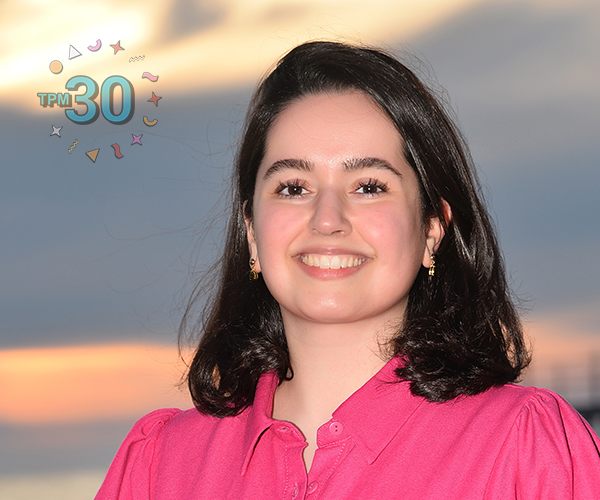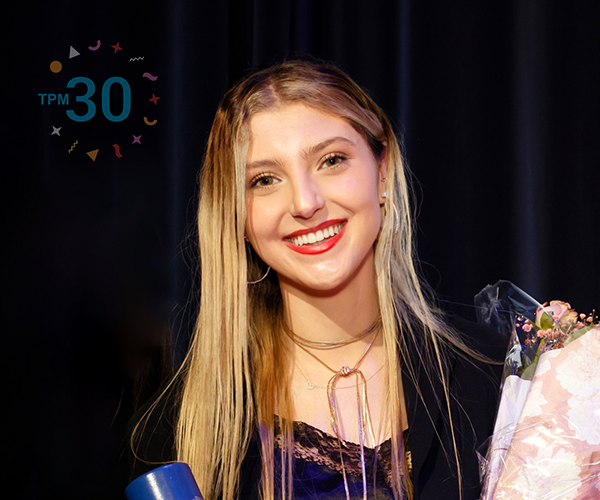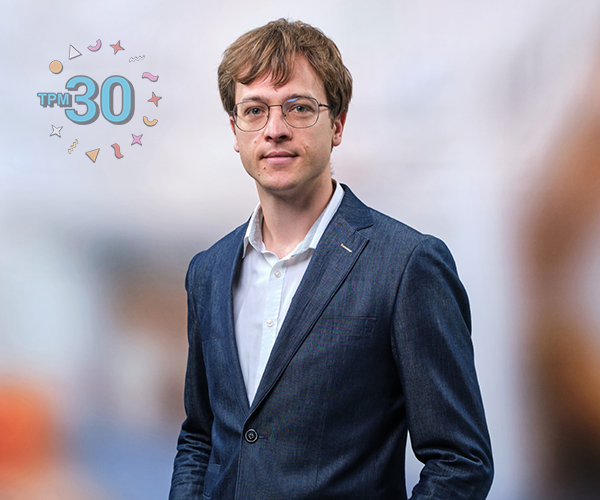TPM Portraits: Saba Hinrichs
For a long time, hardly any focussed attention was paid to the health domain within the faculty of TPM. However, partly thanks to Saba Hinrichs and a new strategic team, that situation completely changed within a couple of years. As an associate professor she uses a systems approach to look for ways to organise the healthcare sector more efficiently, resiliently, and sustainably. A holistic approach is extremely important, certainly in the event of disasters and pandemics, such as Covid-19.
When, at the beginning of 2020, Saba Hinrichs moved to the Netherlands because of her husband's work, she started looking for a new job. She noticed that there were a few vacancies at TPM. "Although I didn't know the faculty, the first thing I thought was: wow, so here is a place where they are doing all the kinds of things I find interesting and have been working on for half my life already. I graduated as an engineer, but I have also done a lot of work in the policy and social domain and both disciplines come together within TPM."
Quite by coincidence Hinrichs discovered that RAND Europe, the research institute that she worked for in England for years, has its roots at TPM. "That gave me the feeling that this was the place in which I ought to be working even more. Previously, whenever I embarked on a new career adventure, it was often because I was following in the footsteps of somebody else, like my supervisors. The difference now was that I did not know anybody at TPM, and it was a new country."
Rejected and then recruited after all
The first TPM vacancy Hinrichs applied for was a tenure track position within the Multi-Actor Systems (MAS) department. "However, to my disappointment I wasn't even invited to the interview. Later I heard that one of the obstacles was because I had a single-domain focus: healthcare, which would make it challenging to integrate within my proposed section. At least, that was the view of the people who read my letter."
Despite this setback Hinrichs was determined not to give up. In parallel, she had also applied for a Delft Technology Fellowship at MAS. "I was completely open about my specialism. Take it or leave it, was what I thought. And to my surprise and delight the people who I talked to in connection with this application were actually enthusiastic. At this point, I was also told there were plans to incorporate healthcare more as a strategic theme within the faculty. When I heard that I'd been accepted, I was ecstatic."
A systems approach to healthcare
Thanks to her appointment, at the beginning of 2021, Hinrichs became the first person within her section and department to focus completely on healthcare. "I thought it was quite strange that so little was still being done in relation to the healthcare domain. If there's one sector where there's a huge need for a Multi-Actor System approach, it's certainly healthcare."
Although the World Health Organisation (WHO) highlighted the importance of systems thinking in healthcare already in the year 2000, the sector is still very fragmented, explains Hinrichs. "What makes it complex, in particular, is the huge number of parties and disciplines involved. These include doctors, nurses, managers, engineers, planners, regulatory bodies, the WHO, the National Institute for Public Health and the Environment (RIVM), insurance companies and policymakers, to name but some. It takes an awful lot of time and patience to bring all those parties together and get them all on the same page."
Partners in crime
In 2021 Hinrichs was not the only one within TPM to focus on the healthcare domain. She connected with three people to whom she refers to as her partners in crime. Shortly after her appointment, she was joined by Irene Grossmann, a surgeon, and Katerina Stankova from other TPM departments. Irene has a great deal of knowledge and experience in the medical world and works on safety in healthcare, and Katerina has a background in mathematics and works on personalised care, such as game-theory based treatments in metastatic cancers. Meanwhile, they connected with Samantha Copeland (VTI), who was already working on ethics of technology in medical contexts. The combination of these different disciplines, perspectives, and sub-domains of focus was a perfect match with my expertise in the field of healthcare systems and policy research."
The societal challenge for Hinrichs is, put simply, how we enable health systems to respond to changing demands for care in different contexts. She explores this by focusing on the healthcare system’s organisation and management, "for example how hospitals can be properly organised as regards IT, logistics and capacity in terms of equipment and manpower. A systems approach can help health providers organise themselves more efficiently, resiliently and sustainably so that they can meet healthcare demand now and in the future. This may also involve better integration between primary (e.g. GP or internist) and secondary care (specialists) – how would that scenario look like, and what are the tactical plans we would have to implement to make that work?"
Prepared for disasters and pandemics
Hinrichs is performing research, for example at the Disaster & Pandemic Preparedness Centre, into the organisation of healthcare in the event of disasters and pandemics, together with Tina Comes, Julien Magana and a team at Erasmus University Rotterdam and Erasmus Medical Centre. "In such situations the influx of patients increases enormously within a short period of time. Often, hospitals are not equipped to cope. The question is how do you ensure that everybody gets the help they need? Among other things I look at how the healthcare sector can prepare optimally for such a situation as well as how you can involve the local community."
The healthcare sector's vulnerability in extreme situations became clear during the coronavirus pandemic. As Hinrichs explains, "The pandemic all too clearly revealed the urgency of a system, but also nuanced approach to organising healthcare. Hospitals turned out to be barely equipped to cope with the large influx of patients, and exposed their vulnerabilities in critical supply chains, for example. On the other hand the pandemic showed clearly how resilient the healthcare workforce can be in coping with such demand and adapting to change. However, they had to pay a high price for this in the form of burnouts and other health complaints. Naturally, that’s something you want to avoid. Taking the learning from such events, using qualitative methods, and then using such knowledge to form models and informing theory of how care can be re-organised, is part of what I study.”
Care for vulnerable groups
Another project Hinrichs is involved in is being carried out in collaboration with the Erasmus MC Sophia Children’s Hospital. “For this project I’m working with Theresia van Essen (of the Faculty of EEMCS) using previously developed mathematical models to determine the optimal capacity in terms of beds and staff. Using approaches inspired by implementation science, I analyse the extent to which the hospital is ready to implement these types of models. This involves both a technical and social component. You need the right IT infrastructure, but it has to be feasible from an organisational perspective and workable for staff. A future step is to ‘plug-and-play’ some of these models into simulations for different scenarios at the hospital."
The fact that the project revolves around a children's hospital makes Hinrichs even more motivated. "Even from a very young age I wanted to do something useful for vulnerable target groups. That's also my motivation for being involved in healthcare. Initially I also wanted to be a doctor, partly because I grew up in Paraguay and Zimbabwe and had seen first-hand how difficult it can be to access healthcare if there's no proper infrastructure, despite the fact that everyone should be entitled to it. These days, although I don't help people individually, I can help to improve the healthcare system as a whole, and that also benefits individual patients."
Specialisation now broadly embraced
Hinrichs has seen that the healthcare domain is being broadly embraced within TPM. "The fact that it's now a strategic theme offers us lots of opportunities. In recent years we've been able to build up a strong community on this issue, partly thanks to a great deal of funding. Now it's also at the forefront of the minds of people who are not directly involved in healthcare. Last year we sent out an internal email appealing to everyone within TPM who is interested in the healthcare domain; and no fewer than 101 people now on our mailing list for Health@TPM.”
According to Hinrichs, TPM is regarded more and more within the health sector as an important academic partner. "In recent years we've set up a number of excellent partnerships with, for example, Erasmus MC and Leiden University Medical Centre. Our dean is sometimes invited to speak with leaders at these institutions. This shows that we've built an excellent bridge between science and practice. I'm extremely proud that we achieved this at TPM. As a result, we co-founded the Institute for Health Systems Science here at TPM in January 2023. We have also launched a new cross-faculty elective open to all MSc students, outlying the key components of health systems, and demonstrating how systems approaches are applied in solving health challenges."
Showcase research more
Hinrichs hopes that TPM will continue down this path in the coming years. "The combination of social and technical elements makes the faculty relatively unique in the academic world. We have all the expertise on board to perform valuable inter-, multi- and transdisciplinary research. I think we should make more effort to showcase the excellent projects we're involved in and the results achieved to the outside world. Not only because what we're doing is important, but also to inspire others and invite further partnerships globally."
TPM Portraits
In the "TPM Portraits" series, we speak to TPM members right across the faculty. In celebration of TPM's 30th anniversary we have had personal conversations with people who are ( or have been) all part of the TPM community in their own way. What have they experienced within the faculty? What is TPM to them today? And how do they see the future? A new portrait appears every two weeks.





